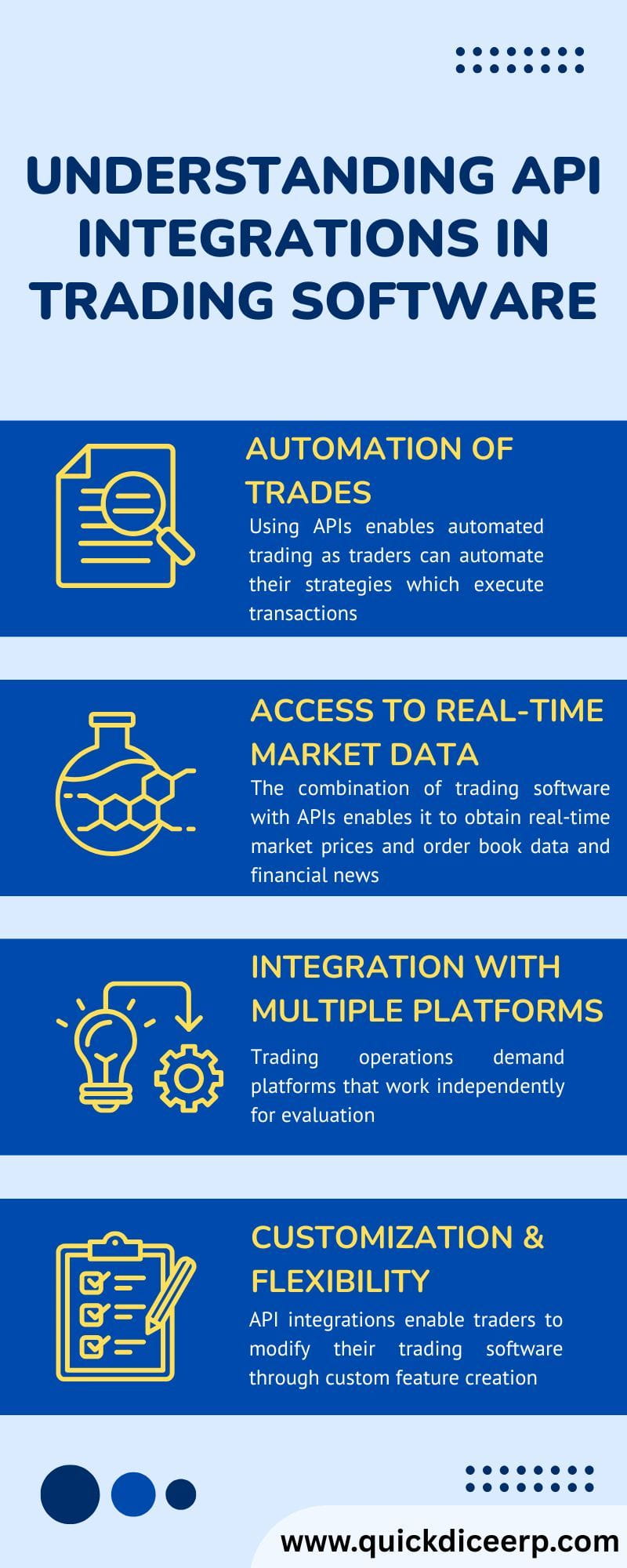Understanding the API integrations in trading applications.
 Aya Basha
01 May, 2025
11 mins read
11
Aya Basha
01 May, 2025
11 mins read
11

Traders in today's financial markets require trading software that allows them to execute trades accurately and promptly. API (Application Programming Interface) connections have transformed trading platforms by enabling increased capabilities and improved functionality. API connections across systems allow traders to execute automated trades and access real-time information, resulting in speedy data-driven choices. The seamless connectivity of systems via API enables traders to create and execute high-level trading strategies while navigating unpredictable markets.
API integrations in trading software heralded a new era of trader-environment interface with markets, resulting in increased operational efficiency and optimal control features. Third-party tool integration allows traders to create customized solutions that address their individual requirements. APIs are becoming increasingly significant in trading software because they allow for the automation of repetitive procedures, the execution of complex strategies, and superior decision-making capabilities in today's financial markets.

What is API Integration in Trading Software?

API integration technology enables common communication protocols across trading platforms, partner systems, application providers, and data sources. APIs enable trading software to interface with other software systems and brokers, sending and receiving critical data.
API connectors give traders access to advanced trading tools that automate their strategies, give them access to a wide range of marketplaces, and allow them to create custom indicators in addition to standard trading software capabilities.
Why Is API Integration Important in Trading Software?

API integration is an essential component of modern trading software systems since traders rely on it to remain competitive in financial markets. Here is why.
1. Automation of Trades
Using APIs makes automated trading easier since traders may automate their methods, which execute transactions based on established criteria without human interaction. This time-saving strategy allows for speedier execution speeds and increased market volatility response.
2. Get real-time market data.
The combination of trading software and APIs provides traders with real-time market pricing, order book data, and financial news updates, allowing them to make quick decisions.
3. Integration across several platforms.
Trading operations require systems that can function independently for evaluation, order placing, and position protection services. APIs allow trading software to incorporate several tools into a single system, hence increasing operating speed and efficiency.
4. Customization and flexibility.
API connectors enable traders to personalize their trading software by adding unique features and indicators, as well as link to external systems, resulting in more flexible trading methods.
What functions are performed when API integrations are used in trading software?

API integration works in trading software by using fundamental concepts, but users must have technical knowledge. The software and an external server communicate in real time via an API. Here's how it works.
The trader must first authenticate their access by obtaining an API key from the API provider. The API key provides secure access to the trading platform.
User authentication allows trading software to communicate with external systems via data exchange features. The software platform either sends trading orders to brokers through its network or collects market feed provider data.
The trading software receives data and makes execution decisions based on its algorithm or trading strategy, which are then executed automatically.
Benefits of API Integration in Trading Software
1. Improved speed and efficiency.
API integration improves the execution speed of trading software by executing transactions instantly based on trader-specified criteria, reducing manual trading delays.
2. Reduced human error.
Trading procedures ensure error-free execution through automated API integrations, protecting traders from both faulty order type and inaccurate trade execution. Because of the significance of this criterion, precision is critical in high-frequency trading.
3. Improved strategy execution.
The API functionality enables traders to validate their trading methods against historical market data and execute virtual market simulations before adopting them in actual trading situations. The technology ensures that techniques are reliable before they are implemented in the real world.
4. Cost-effective solutions
Brokers and trading software providers provide their clients economical API access, allowing traders to employ advanced tools while avoiding the fees associated with custom-built trading systems.
Top API Integrations for Trading Software
Trading software developers can enhance the usefulness of their products by integrating many APIs.
1. Broker APIs.
Trading software users gain direct access to broker systems through these APIs, allowing them to conduct trades and examine current pricing data.
2. Market data APIs.
These APIs give traders with current and historical market data, allowing them to make strategic decisions.
3. Risk management APIs
Effective risk management is critical to trading activities. These APIs provide risk management capabilities to trading apps, including margin computations, stop-loss limits, and other important risk characteristics.
4. Charting and Technical Analysis APIs
Trading platforms that support these APIs enable users to create elaborate charts for visualizing market patterns while also providing technical analysis tools to help them improve their trading strategy.
Problems With API Integration in Trading Software
Although API connectivity for trading software has many benefits, it also poses a number of practical problems. Here are a few prevalent issues:
Non-programmers will struggle to implement and configure APIs.
Data transmission delays induced by the API provider may affect the speed and accuracy of trade execution.
API security is based on strong secure access protocols because financial data is still subject to hacking attempts.
Conclusion
API integrations are critical for traders looking to get a competitive edge in today's markets. Traders can increase their approach efficacy and eliminate operational faults by automating functions and supplying data instantly via API. When trading platforms join to form unified ecosystems, traders gain complete access to the tools that enable efficient and adaptive trading.
As financial markets expand, API linkages will become increasingly vital. Incorporating these advanced features into trading software provides traders with a major advantage by helping them to make faster, smarter decisions that keep them ahead of the competition. API technology has become increasingly important in trading platforms since it develops critical features for current trading success.
Written By:
Aya Basha



Hotels at your convenience
Now choose your stay according to your preference. From finding a place for your dream destination or a mere weekend getaway to business accommodations or brief stay, we have got you covered. Explore hotels as per your mood.


